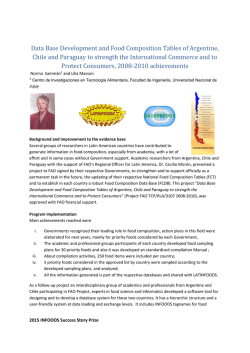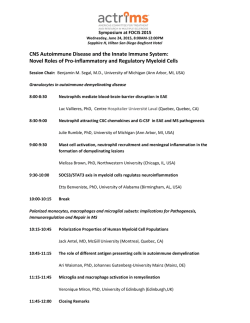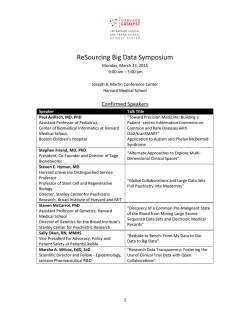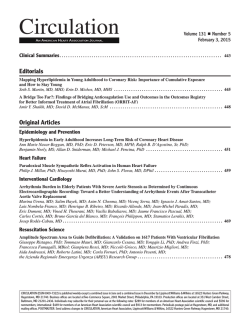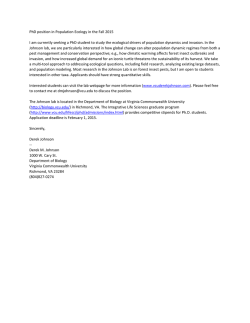
Scientists` Open Letter to FAO Director General Graziano da Silva, in
Scientists’ Open Letter to FAO Director General Graziano da Silva, in Support of the February 2015 Declaration of the International Forum for Agroecology 24 June 2015 Dear Director General da Silva, As scientists and scholars working in sustainable agriculture and food systems, we are writing to support and bring to your attention the recent Declaration of the International Forum for Agroecology1, dated 27 February 2015. The Declaration affirms that agroecology can produce food in ecologically sustainable and socially just ways, and can “generate local knowledge, promote social justice, nurture identity and culture, and strengthen the economic viability of rural areas.” The Nyéléni Agroecology Declaration resulted from a historic meeting in Nyéléni, Mali of “delegates representing diverse organizations and international movements of small-scale food producers and consumers including peasants, indigenous peoples and communities (including hunters and gatherers), family farmers, rural workers, herders and pastoralists, fisherfolk and urban people.” Together, they represented those who produce as much as 70 percent of the world’s food, as recognized in the Food and Agriculture Organization of the United Nations (FAO)’s 2014 State of Food and Agriculture report. In September 2014, many of us wrote to you in the Scientists’ Support Letter for the International Symposium on Agroecology. We would like to reiterate that agroecology as a science, practice and social movement fosters an uncommonly promising synthesis of knowledge across many domains. In agroecology, traditional and experiential knowledge comes together with scientific knowledge, both social and natural, to animate a transdisciplinary, action-oriented approach to agriculture. This synergy fosters the sustainable production of healthy, diverse foods and provides a stable livelihood to farmers, while decreasing the impacts of agriculture on biodiversity, soils, waterways and climate. Applying principles of ecology to the design and management of such systems, it considers the food system as a socioecological system – encompassing economic, cultural and political dimensions while facilitating both sustainability and justice. We find it disappointing, then, that agroecology is only mentioned once in the FAO Medium Term Plan2, while “climate-smart” agriculture and various articulations of so-called sustainable intensification are mentioned throughout. Quoting from our previous letter, “no approach can be scientifically assessed as ‘sustainable’ according to most established definitions of sustainability” without incorporating “distributive and procedural justice.” Climate-smart 1 Hereafter, the “Nyéléni Agroecology Declaration.” “The Director-General’s Medium Term Plan 2014-17 (reviewed) and Programme of Work and Budget 2016-17,” dated June 2015, retrieved from http://www.fao.org/3/a-mm710e. 2 agriculture and sustainable intensification lack the elements of procedural and distributive justice found in agroecology and food sovereignty, and so their ability to effectively address climate change and sustainability are scientifically questionable. We instead strongly encourage the FAO to seek to build on the Nyéléni Agroecology Declaration, in particular, to build on its incorporation of sovereignty, rights and justice as key elements of a rational approach to a sustainable and food-secure system that promotes human dignity. At least, a greater focus on agroecology within FAO’s strategic planning would seem to be appropriate given the three regional agroecology meetings in Latin America and the Caribbean, Africa and Asia to be held this year under the FAO’s auspices. The pertinence of agroecology in FAO’s work is particularly clear today with the first Regional Agroecology Meeting to be held shortly in Brasilia. THE NYÉLÉNI AGROECOLOGY DECLARATION’S COMMON PILLARS AND PRINCIPLES Given our support for a comprehensive socio-ecological approach to agroecology, we call on the FAO to give strong regard to the recent Nyéléni Agroecology Declaration, particularly its Common Pillars and Principles of Agroecology. In the previous letter, we encouraged the FAO member states and the international community to build on the proceedings of the FAO International Symposium on Agroecology to launch a U.N.-wide initiative on agroecology. We reiterate that call here, and propose that the Nyéléni Agroecology Declaration offers a unique opportunity to serve as one of the foundations of such an initiative. As a document drafted by a wide array of civil society constituencies, it represents the uniting potential of agroecology. It is a logical basis for continued conversations around building agroecology as a potential pillar of work within the Committee on World Food Security (CFS) and to provide guidance for the relevant FAO workstreams that will develop at national, regional and global levels in the future, following FAO’s commitment to integrate the knowledge exchanged during the 2014 International Agroecology Symposium into its internal work. Further, it can contribute substantially to inform the discussions and negotiations about agriculture within the U.N. Framework Convention on Climate Change and in the post-2015 Sustainable Development Agenda. Adding to our previous call, we believe that the FAO 2015 regional symposia on agroecology are important opportunities for progressing the agroecological agenda, but realizing those opportunities will require positive actions. We therefore call on the FAO central administration, the regional and relevant national offices, as well as member states to make sure that: - The terms of reference of all the regional symposia (objectives, methodology, scope, expected outcomes, detailed program) are, or continue to be, developed with active participation and reflect the priorities of autonomous diverse organizations and international movements of small-scale food producers and consumers, as represented through the International Planning Committee for Food Sovereignty (IPC); - The regional symposia duly take into account and build on the Nyéléni Agroecology Declaration, and that their outcomes are consistent with it. This notably implies avoiding the reduction and cooptation of agroecology as a narrow set of technologies to fine-tune and further consolidate the industrial food system through concepts such as “climate-smart agriculture” or “sustainable intensification.” Moreover, we call upon the FAO and member states to also plan the organization of two additional regional symposia on agroecology in Europe and North America before the organization of the 2016 FAO Regional Conferences. The Regional Meetings will be exciting fora for advancing the agenda of agroecology in collaboration with scientists and farmers. We stand ready, as scholars, to aid the FAO and the world’s small-scale food producers and consumers, peasants, indigenous peoples and communities, hunters and gatherers, family farmers, rural workers, herders and pastoralists, fisherfolk and urban people, providing whatever knowledge and analysis we can to advance a comprehensive agenda on agroecology in the context of world food security, with particular attention to the four pillars of the food system: social, economic, environmental and cultural. We would be happy to contribute scientific analyses from our various established research projects relevant to the principles and pillars of the Nyéléni Declaration in particular, and look forward to helping build on the “dialogue of knowledges3” that is at the heart of agroecology in order that we all may advance forward towards a sustainable, agroecological, food-secure and food-sovereign future. Signed, M. Jahi Chappell, Ph.D. Director, Agroecology and Agriculture Policy Institute for Agriculture and Trade Policy (IATP) Minneapolis, MN, USA * All institutional affiliations provided for identification purposes only and do not imply endorsement by the respective institutions. ** Please direct return correspondence to Dr. M. Jahi Chappell at [email protected]. Correspondence will be forwarded to the following individuals who have endorsed the letter. 3 “Dialogue of knowledges” is the translation of a specific term from social movements, “dialogo de sabers,” meaning a dialogue between different forms of knowledge/ways of knowing. Retrieve from https://www.academia.edu/5817512/Di%C3%A1logo_de_saberes_in_La_V%C3%ADa_Campesina_food_sovereign ty_and_agroecology_by_Mar%C3%ADa_Elena_Mart%C3%ADnezTorres_and_Peter_M._Rosset._Journal_of_Peasant_Studies_2014. Signing on the behalf of: Miguel A Altieri, PhD University of California-Berkeley Berkeley, CA, USA Colin Anderson Postdoctoral Research Fellow Centre of Agroecology, Water and Resilience Coventry University Coventry, UK Molly D. Anderson Professor of Food Studies Middlebury College Middlebury, VT, USA Catherine Badgley Associate Professor University of Michigan Dept. of Ecology & Evolutionary Biology, Residential College Museum of Paleontology Ann Arbor, MI, USA Jennifer Blesh Assistant Professor University of Michigan School of Natural Resources and Environment Ann Arbor, MI, USA Professor Valentine Cadieux Director of Environmental Studies Hamline University St. Paul, MN, USA Liz Carlisle, PhD, Fellow Center for Diversified Farming Systems University of California-Berkeley Berkeley, CA, USA Dr. A. Cristina de la Vega-Leinert Geography and Geology Institute Ernst-Moritz-Arndt University Greifswald, Germany Bruce G. Ferguson, PhD Coordinator, Department of Agriculture, Society, and the Environment El Colegio de la Frontera Sur San Cristóbal de Las Casas, Chiapas, México Joern Fischer Professor Leuphana Universität Lüneburg Lüneburg, Denmark Mike Friedman Assistant Professor of Biology American International College of Arts and Sciences of Antigua University Park, Coolidge St. John's, Antigua, W.I. Luis García-Barrios, Phd Investigador Titular Investigador Nacional Ecosur San Cristóbal de Las Casas, Chiapas, Mexico Stephen R. Gliessman Editor, Agroecology and Sustainable Food Systems Professor Emeritus of Agroecology University of California – Santa Cruz Santa Cruz, CA, USA Garrett Graddy-Lovelace, PhD Assistant Professor Global Environmental Politics School of International Service, SIS 306 American University Washington, DC, USA Doug Gurian-Sherman, Ph.D. Director of Sustainable Agriculture and Senior Scientist Center for Food Safety 660 Pennsylvania Avenue S.E. Washington, DC, USA Alastair Iles Professor, Department of Environmental Science, Policy & Management University of California-Berkeley Berkeley, CA, USA S. Ryan Isakson Centre for Critical Development Studies and Department of Geography University of Toronto Toronto, Ontario, Canada Jack Kloppenburg Professor Emeritus Department of Community and Environmental Sociology University of Wisconsin Madison, WI, USA Jonathan Latham, PhD Executive Director The Bioscience Resource Project Ithaca, NY, USA Claire Luby, M.S. PhD candidate University of Wisconsin-Madison Madison, WI, USA Kathleen McAfee Associate Professor International Relations San Francisco State University San Francisco, CA, USA Nathan McClintock, PhD Assistant Professor Toulan School of Urban Studies & Planning Portland State University Portland, OR, USA Philip McMichael Professor and Chair Department of Development Sociology Cornell University Ithaca, NY, USA V. Ernesto Méndez, Ph.D. Associate Professor Agroecology & Environmental Studies Agroecology and Rural Livelihoods Group (ARLG) University of Vermont Burlington, VT USA Albie Miles, PhD Assistant Professor Sustainable Community Food Systems University of Hawai'i, West O'ahu Kapolei, HI USA Maywa Montenegro, M.S. PhD Candidate Environmental Science, Policy, and Management University of California-Berkeley Berkeley, CA, USA Raj Patel Research Professor Lyndon B. Johnson School of Public Affairs The University of Texas at Austin Austin, TX USA Antonio Roman-Alcalá International Institute of Social Studies The Hague, Netherlands Alicia Tenza Peral Departamento de Biología Aplicada Área de Ecología Universidad Miguel Hernández Elche, Alicante Spain John Soluri Associate Professor Carnegie Mellon University Dietrich College of Humanities and Social Sciences Pittsburgh, PA, USA Aileen Suzara MPH in Public Health Nutrition University of California-Berkeley Berkeley, CA, USA Kathryn Teigen De Master Assistant Professor Agriculture, Society & the Environment Department of Environmental Science, Policy & Management University of California-Berkeley Berkeley, CA, USA Alicia Tenza Peral Departamento de Biología Aplicada Área de Ecología Universidad Miguel Hernández Elche, Alicante, Spain Ilyas Siddique Professor of Agroecosystems Dept. of Crop Science Center of Agrarian Sciences Federal University of Santa Catarina Florianópolis, Brazil Will Valley, PhD Instructor, Applied Biology Academic Director, Land, Food, & Community Series Faculty of Land and Food Systems University of British Columbia Vancouver, BC, Canada John H. Vandermeer Professor, University of Michigan Dept. of Ecology & Evolutionary Biology, Residential College Museum of Paleontology Ann Arbor, MI, USA Tom Wakeford Reader (Associate Professor) Centre for Agroecology, Water and Resilience Coventry University Coventry, UK Robert G. Wallace, Ph.D. Visiting Scholar Institute for Global Studies University of Minnesota Minneapolis, MN, U.S.A. Justine Williams PhD candidate Department of Anthropology University of North Carolina at Chapel Hill Chapel Hill, SC USA Hannah Wittman Associate Professor Faculty of Land and Food Systems Institute for Resources, Environment and Sustainability The University of British Columbia Vancouver, BC, Canada
© Copyright 2026
